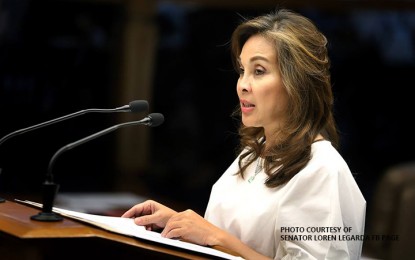
MANILA - Senate President Pro Tempore Loren Legarda on Thursday urged both national and local governments to help ensure the effective implementation of environmental laws which provide for the conservation, preservation and protection of marine ecosystems which are vital for climate change adaptation along the coasts.
“Let us implement Philippine environmental laws in our efforts to bring back the bounty and restore the ecological integrity of our bodies of water," Legarda said in a statement.
The senator made the appeal following the Philippine senators' meeting with their French counterparts where they discussed matters of global concern including environment and climate change.
Legarda, who led the Philippines' concurrence to the High Ambition Coalition (HAC) for Nature and People, said this in line with the 30x30 global target which aims to protect at least 30 percent of the world's land and ocean by the year 2030.
Attaining this objective includes the protection of natural maritime ecosystems that serve as one of the main and biggest natural “carbon sinks.”
A carbon sink is anything that absorbs more carbon from the atmosphere than it releases. Thus, protecting maritime ecosystems is essential for tackling climate change and keeping our climate stable.
Besides being a carbon sink, Legarda said “planting and rehabilitation of mangroves, and seagrasses along the shorelines of vulnerable coastal communities would also serve as natural buffers against storm surges, flooding, erosion and other climate hazards.”
Aside from these, the country's coastal resources characterized by its rich marine life have always been a reliable source for food, employment, energy and even recreation for many Filipinos.
To further protect the country’s marine ecosystems, Legarda also called on the national government to consider investing in “blue carbon” initiatives that will further help protect our coral reefs, seagrass beds, lush mangrove forests, and other coastal and marine sources.
Building a blue carbon economy involves the creation of ocean sectors and businesses that are socially just, environmentally sustainable, and economically profitable.
"The risks are rapidly growing not only for those in coastal communities, as climate change drives rising sea levels, warmer oceans and increasingly ferocious cyclones. We need to recalibrate our strategies on climate change adaptation, invest in blue carbon initiatives, and embrace the available solutions that nature presents to us," Legarda said. (PNA)
